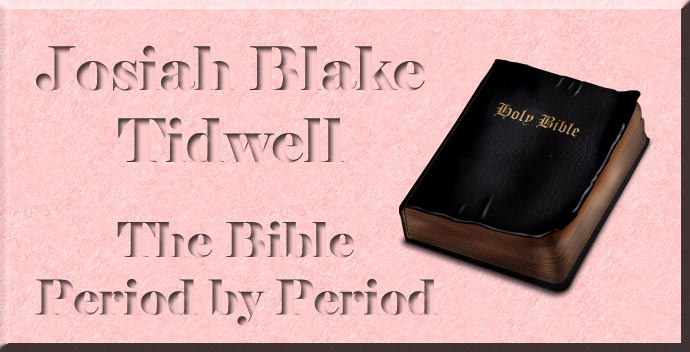
The Bible Period by Period
By Josiah Blake Tidwell
Chapter 21
|
Destruction of The Temple to The Death of The Apostle John. Epistles of John and Revelation. The Period of History. This period begins with the fall of the city of Jerusalem, A.D. 70, and ends with the death of John, the last of the apostles. We have but little scripture touching the conditions of this period. Indeed, all of it is inferential so far as the scripture is concerned. We may, however, learn much from secular history and tradition. The Destruction of Jerusalem. Jesus had predicted the fall of this beloved city. Many frightful massacres of Jews had occurred in Judea before the end of the last period, but it was in A.D. 70, about two years after Paul's death, that Titus destroyed Jerusalem and the temple and Judaism had its downfall. After this the marks of separation between Christianity and Judaism became more and more distinct. From that time the Jewish religion has never gained ascendancy in any country. From A.D. 70 to A.D. 100. The general history of this period has in it little of interest. At the end of the very creditable reign of emperor Vespasian, who was on the throne of Rome when Jerusalem fell, Titus, called "The delight of the human race," reigned in his stead. During his reign occurred that awful eruption of Vesuvius that buried Pompeii. Titus was succeeded by his brother Domitian, who was one of the greatest tyrants that ever ruled in any country. It is generally supposed that John was banished to the Isle of Patmos during the reign of Domitian. After Domitian reigned Nerva and Trojan, the last of which showed great talent and brought back much of the early vigor to the empire. The cyclopedias and histories of Rome will give information about the period. The Literature of the Period. The history of the Christians in this period is very obscure because of the scanty literature produced in it. What literature we have of these years may be divided into two classes: (1) Scripture books. These are the three epistles of John, which were written at Ephesus a while before his banishment, probably about 80 or 85 A. D., and the Revelation, which was composed while in exile on Patmos about 95 or 96 A. D. (2) Some early Christian writings not included in the canon of the New Testament. Of this class of writings is the Epistle of Clement of Rome to the Corinthians, written about 96-98 A.D., and the Epistle of Barnabas and the Teaching of the Twelve Apostles, probably written sometime before A.D. 100. This then is a period of transition from the Canonical to the Patristic literature. Death of John and End of Scripture History. John was on the Isle of Patmos as an exile because of his testimony for Jesus. He seems to have lived until the end of the first century and is said to have met death in a cauldron of boiling oil. The last of the apostles being now dead the canon of the scripture is closed and the power of miracles removed and Christianity left to win its own way by means of the efforts and the prayers of the disciples and the grace which God ordinarily grants to them. Thus ends the scripture history-with a completed revelation and the Christian churches set up as a witness for Christ. Lessons of the Period. It is difficult to draw, from a period of which we know so little, any certain conclusions. We are perhaps safe in making some observations. (1) Christianity must always make its way against opposition. (2) The Christian faith gives courage and joy in the most trying circumstances. (3) Christianity will finally triumph over its enemies. For Study and Discussion. (1) From the Bible dictionaries, cyclopedias, etc., study the reigns of the different Roman emperors of this period. (2) Learn something of the nature and contents of the Patristic literature mentioned in this discussion. (3) The four New Testament books of this period. END |
|
 |
 |
|
|
|
-
Site Navigation
 Home
Home What's New
What's New Bible
Bible Photos
Photos Hiking
Hiking E-Books
E-Books Genealogy
Genealogy Profile
Free Plug-ins You May Need
Profile
Free Plug-ins You May Need
 Get
Java
Get
Java.png) Get Flash
Get Flash Get
7-Zip
Get
7-Zip Get Acrobat Reader
Get Acrobat Reader Get
TheWORD
Get
TheWORD